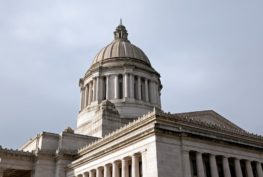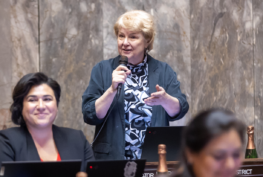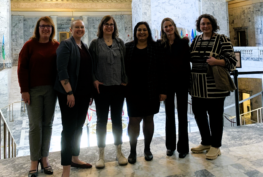OLYMPIA – A bill that would create a public financial cooperative in Washington state was approved by the House Consumer Protection & Business Committee on Thursday.
The new public cooperative created by SB 5188, sponsored by Sen. Patty Kuderer (D-Bellevue), would provide alternatives for local and tribal governments to fund critical infrastructure and economic development needs.
“I couldn’t be more thrilled with today’s vote in the House Consumer Protection & Business Committee,” said Kuderer. “Senate Bill 5188 will provide local and tribal governments with more tools to boost economic development and affordable housing supply in their communities. This bill is especially relevant right now with the public health crisis forcing local governments to find new and creative ways to solve problems. Having a public co-op will help them develop new solutions to the challenges facing their residents.”
Profits from rates and fees charged by the public cooperative would be returned to the community through investments in local economic development and infrastructure projects. After the initial five years of operations, the public cooperative would have a goal of providing 35 percent of the amount it lends on an annual basis to support housing in low- to moderate-income areas.
“The public co-op’s core mission will be to serve the public, through reinvesting those profits back into the very communities we live in,” said Kuderer.
The public cooperative would be a public entity, independently governed, and staffed by professionals with experience in the financial service industry. It would operate under the oversight of elected state officials and, as an independent entity, its operations would not affect the state’s debt limit or its credit rating.
SB 5188 evolved from those original public financial institution discussions. The University of Washington Evans School of Public Policy & Governance was tasked by the legislature to examine the idea in greater detail. The Evans School workgroup issued a design framework and professional business plan last May.
The workgroup identified benefits of a public cooperative to local governments like:
- Offering financing on public infrastructure projects at lower underwriting/origination fees than investment banks.
- Offering more competitive rates than investment banks for certain types of projects.
- Enabling local governments to make deposits at potentially higher rates of return than what are currently available through the Local Government Investment Pool and other investment options. Such deposits could also be a source of funds for the cooperative to extend short-term loans to members.
SB 5188 has until April 11 to be approved by the House to be eligible to become law this year.
The 2021 legislative session is scheduled to adjourn on April 25.





